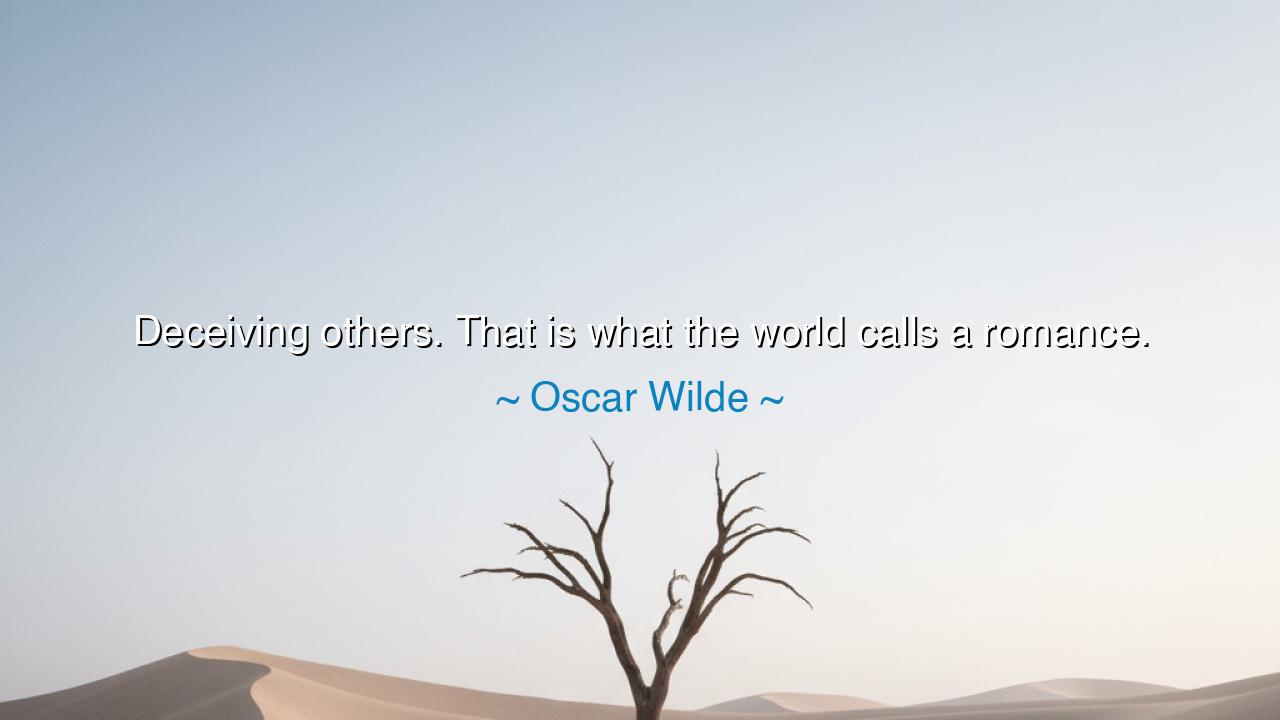
Deceiving others. That is what the world calls a romance.






The words of Oscar Wilde, ever sharp as a blade cloaked in velvet, cut to the heart of human vanity: “Deceiving others. That is what the world calls a romance.” In this single phrase, he unmasks the illusions that society often decorates as love. To Wilde, who lived amidst masks, hypocrisies, and the glittering facades of Victorian society, romance was not always truth—it was performance. He points to the tragic comedy of men and women, who in the name of passion, weave stories, hide flaws, and present dreams in place of reality.
The ancients, too, would have known this truth. For even in the myths of old, deception clothed itself in the garments of love. Paris stole Helen from Sparta under the guise of destiny, but it was also trickery that led to a thousand ships launched and a city burned. Cleopatra wrapped herself in a carpet to meet Caesar, not with raw honesty but with spectacle and cunning. In both cases, the world sang of “romance,” yet beneath the songs lay calculation, disguise, and the careful crafting of appearances. Wilde’s wit exposes this eternal paradox: what we call romance often rests upon illusions willingly believed.
There is in this saying not only satire but sorrow. For Wilde himself knew the weight of masks. In his plays, his epigrams, and even his own life, he wrestled with the tension between appearance and truth, between what the world demanded and what the heart desired. He knew that men and women, longing to be admired, will deceive not only others but themselves, mistaking performance for passion. Thus, romance becomes not the pure union of souls but the elaborate staging of dreams, fragile as glass, doomed to shatter when reality presses too hard.
And yet, Wilde does not simply scorn romance—he reveals its danger so that we may approach it wisely. For to deceive another in love is to build a house upon sand, beautiful at first, but collapsing in time. The world may celebrate such a union, may dress it in poetry and song, but without truth it cannot endure. Wilde’s irony is a warning: beware of the lies that lovers tell, whether small or great, for they may be praised as “romantic,” yet they corrode the very heart they claim to honor.
History provides countless lessons. Consider the ill-fated marriage of Henry VIII and Anne Boleyn. At first, it was wrapped in the trappings of courtly romance, whispered promises, and dazzling pageantry. Yet beneath it lay deception—political maneuvering, hidden motives, and veiled ambitions. The world called it passion; time revealed it as ruin. What began as spectacle ended in blood. Wilde’s words echo here: when love is built upon deceit, no matter how radiant it appears, it is doomed to collapse beneath its own falsehoods.
The lesson is clear: true romance cannot be born of deception. Though the world may praise the masks we wear, though it may adorn the illusions of passion with poetry, such unions are fragile. Real love demands vulnerability, honesty, and truth—even when it is difficult, even when it is not adorned with glamour. The ancients knew this too: “Better is open rebuke than hidden love,” said the wise, for love without truth is only shadow.
Therefore, let all who hear take action: do not adorn your love with falsehoods, nor deceive those whose hearts you claim. Seek instead the courage to be known, to be seen without disguise. Speak plainly, love honestly, and let your romance be not performance but reality. For the world may admire deception for a time, but only truth endures.
Thus Wilde’s epigram, though barbed with wit, is also eternal wisdom: romance built on deception is illusion, but romance built on truth is life. Let the world call falsehood “romantic” if it wishes—let us, instead, choose love that does not deceive.






AAdministratorAdministrator
Welcome, honored guests. Please leave a comment, we will respond soon